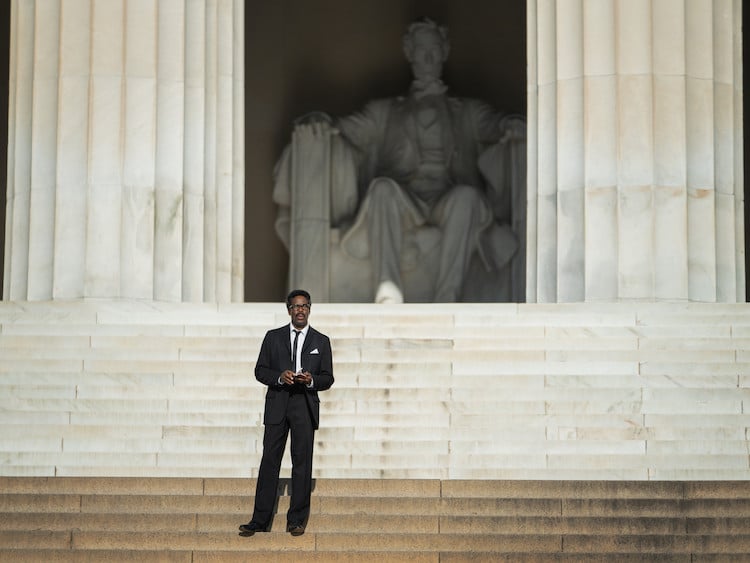Openly gay civil rights titan Bayard Rustin, the architect of Martin Luther King, Jr.’s March on Washington, is the subject of the Netflix biopic “Rustin” that will be available Nov. 17.
Colman Domingo stars as Rustin.
The film focuses on Rustin’s time as a close confidant of King and the mastermind of the 1963 March on Washington for Jobs and Freedom.
Despite Rustin’s amazing activist skills, he was ignored and pushed to the back of the bus by homophobic Black leaders in the Civil Rights Movement.
“He was ostracized particularly by black leaders because they were homophobic. They said he would bring disgrace on them because he was gay,” Angela Bowen, assistant professor of women’s studies at Cal State Long Beach, told this reporter in 2003.
“Bayard knew they were little minded, and he was ahead of his time,” she said.
Lee Glaze led early gay rights protest at The Patch 55 years ago

Colman Domingo stars as Bayard Rustin in the Netflix biopic “Rustin.” Photo: Parrish Lewis/Netflix
In 1960, while leading the push for protests at the National Democratic Party Convention in Los Angeles, Rustin was attacked by Congressman Adam Clayton Powell, Jr. as an “immoral element” in the Civil Rights Movement. According to John D’Emilio’s book, “Lost Prophet: The Life and Times of Bayard Rustin,” Powell, Jr. phoned King and threatened to publicly charge that King and Rustin were lovers. King withdrew his support for the protests at the convention and removed Rustin from his staff.
“Bayard was so incredibly talented,” Nancy Kates, co-producer and director of the documentary “Brother Outsider: The Life of Bayard Rustin,” told this reporter in 2003.
“He would rise to the top of something, then somebody would take a pot shot at him because of him being gay or issues around his sexuality and that would force him to leave or they’d fire him.
“Then he’d (rise to the top) again. He was like the Energizer Bunny,” Kates said. “He refused to be vanquished by people because they didn’t approve of him.”
Rustin also has been largely forgotten in history books.
Here are seven things to know about Rustin.
- Born in 1912 in West Chester, Penn., Rustin was raised by his grandparents and deeply influenced by his grandmother, a fierce advocate for social justice.
- By the 1940s, Rustin was a committed missionary of Gandhian nonviolence. Rustin spent three years (1943-46) in a federal penitentiary as a conscientious objector to World War II (He was a Quaker.).
- In 1947, Rustin organized the first “Freedom Rides” through the South. The riders were beaten, arrested and fined. Rustin served 22 days on a North Carolina chain gang.
- Rustin, 40, was arrested Jan. 21, 1953, in Pasadena, and convicted of “vagrancy” for violating a morality offense that was often used to discriminate against and criminalize LGBTQ and Black communities, but has been repealed. At the time, homosexuality was not only still classified as a mental illness, but also illegal in many parts of the nation. Members of the LGBTQ community also were persecuted under various morality codes in many states, including California. Rustin was arrested for having consensual sex with two white men in a parked car, but the white men were not arrested. After the arrest, Rustin was convicted, served 50 days in jail, and was forced to register as a sex offender. Rustin was posthumously pardoned by Gov. Gavin Newsom in 2020 for the more than 70-year-old “vagrancy” conviction.
- In 1956, during the initial stages of the Montgomery bus boycott, Rustin met the 26-year-old King, Jr. Rustin schooled the young leader in the mechanics of running a nonviolent protest. “Rustin’s greatest historical legacy is that he did more than anyone to bring the Gandhian message of militant nonviolence to the United States and to the black freedom struggle,” John D’Emilio, author of “Lost Prophet: The Life and Times of Bayard Rustin,” told this reporter in 2003.
- In 1963, A. Philip Randolph, president of the powerful Brotherhood of Sleeping Car Porters, tapped Rustin to organize the March on Washington. Rustin and Randolph saw the event as far grander than ending the ruler for sitting at the back of the bus. They envisioned it as a “catalyst which mobilizes all workers behind demands for a broad and fundamental program of economic justice.”
- President Barack Obama awarded Rustin, who died in 1987 at the age of 75, a Presidential Medal of Freedom in 2013.
